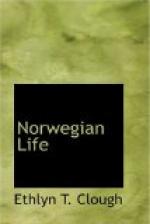In himself the new king is a clean-lived, healthy young man of thirty-three, in personality quite fit to represent a nation which thinks well of itself. Tall, though not quite so tall as his uncle, Prince Christian, whose mark on the famous old royal measuring-column at Roskilde comes just under that of the giant, Peter the Great, King Haakon is slight, yet vigorous-looking, and splendidly well set up. The face, while scarcely so handsome as the profile pictures lead us to think, is a distinguished one, and has for Norway this charm, that it is markedly not of the Bernadotte type, although his mother is a Bernadotte. Those who know him describe him as an extremely intelligent and sensible young man, easy and tolerant without being weak, and capable of strenuous devotion to hard work. These things bespeak an industrious, efficient, and tractable king, such as the Norwegians, who would equally resent either vacillation or tyranny, know how to appreciate.
It has been said in France that King Haakon abandons tiller and compass for crown and scepter without one hour’s training in politics or diplomacy.
The statement appears incontestable. In view of the remarkable longevity of the late king of Denmark, and the excellent health and prospects of the Crown Prince and his immediate heir, this younger son of a royal house was not brought up to look for a crown. Instead, he was destined from the outset for a naval career. For all that, it is not safe to say that he has had no training in politics or diplomacy. One can scarcely grow up in the family of the “father-in-law of Europe” and not learn the principles of the great game of world affairs. King Haakon is no stranger to the queer old palace among the beeches at Fredensborg, where every summer King Christian gathered together his children and grandchildren and great-grandchildren from the courts of England, Russia, Denmark, Sweden, and Greece; and where conversations took place which, if reported, would vitally interest the whole round world. In his lifetime, the Czar Alexander III was particularly fond of holding long talks at Fredensborg with his nephew Karl, then a lieutenant of the navy, whom he found especially intelligent and open-minded.
It is thought in Copenhagen that King Haakon may, even during the last years of his father’s life, have had some experience in the government of Denmark, since his father, the Crown Prince, was called upon to perform many of the old king’s duties. At least, if he did not actually transact royal business, he acquired no small acquaintance with the working of government machinery.




